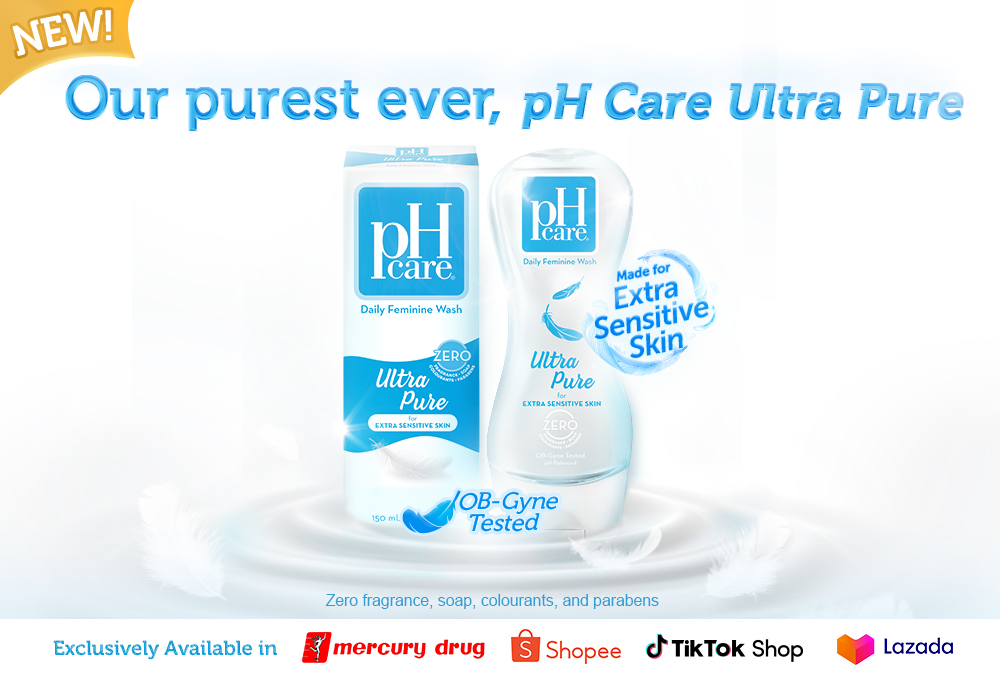Acne, Body Hair and Odor. It is Just Puberty!
.jpg)
“Should I get rid of the bush down there?” and other questions you’re too embarrassed to ask—answered!
Let’s get real here: Puberty is overwhelming.
You’re going through a lot of changes in pretty much every aspect of your life—from dealing with schoolwork that seemingly gets tougher by the day, to deciding what clothing style or even hairstyle you like best, to how you approach your relationships with people. But perhaps, the most stressful changes you are experiencing right now are the ones happening in your own body!
One look in the mirror was all it took for you to realize that you’re no longer the little girl you were yesterday. A tiny painful bump on your cheek a.k.a. a pimple is probably stressing you out because how will you face your crush tomorrow? Hair is also growing in places you’re not too happy about. And…what the heck is that smell?! *sniff, sniff*
Oh, puberty…
We totally get your growing pains, which is why we came up with this Q&A to address some of the most embarrassing questions you’re probably too shy to ask.
Skin Trouble
Why am I getting pimples?
Your body naturally secretes sebum to keep your skin and hair moist. However, during puberty, hormonal changes prompt your body to produce more sebum than it used to. Because of this, excess sebum easily attracts bacteria and mixes up with dead skin cells, clogging your pores resulting in acne—a skin condition that comes in different kinds of bumps. These include blackheads, whiteheads, and pimples.
I’m getting pimples on my body, too—is that something I should be worried about?
We hate to break this to you but acne doesn’t show up on your face only. You might find pimples on your chest, back, and even in your groin area—but don’t worry! That’s rather normal for growing girls like you!
How can I avoid breakouts?
It’s highly recommended that you wash your face twice daily—once in the morning and again before you go to bed to get rid of dirt and other impurities. Washing your face more than that can dry out your skin and make your body produce more sebum, which could do more harm than good. Also make sure that you’re washing your face with a gentle facial cleanser as harsh chemicals can irritate your sensitive skin.
Are there things I can do to naturally get rid of acne?
There are several lifestyle changes you can try to reduce skin breakouts:
- Getting enough sleep at night
- Managing your stress levels
- Staying hydrated
- Eating well-balanced meals
- Cutting back on sweets and oily food
I’m experiencing severe acne. Should I see a doctor?
If your acne appears severe and is taking a toll on your self-esteem, don’t think twice to schedule an appointment with a dermatologist. They can help you figure out a treatment plan to fix your skin issues. You might even be referred to an OB-GYN or endocrinologist if they suspect that the underlying cause of your acne has something to do with your hormones.
Hairy Dilemma
The hair in my intimate area is getting thicker—is that normal?
Yes, it’s perfectly normal! When your pubic hair starts growing, it appears light at first, but it eventually becomes longer, thicker, and curlier.
It’s getting itchy. Can I get rid of pubic hair?
You might have heard that getting rid of your pubic hair will make you “cleaner.” This isn’t necessarily true. Hair grows down there to protect your genitals, so removing your pubic hair will make your body lose its natural ability to trap bacteria before they enter the vagina.
I found hair growing on my nipples—should I be concerned?
Not at all! However, if the hair growth appears dense, it might be related to a hormonal condition that you should have a doctor check on.
My friends have started shaving their legs—should I, too?
It’s pretty common for women to shave their legs, but it’s something that’s completely optional. You don’t have to do it if you don’t want to, especially if you’ve got sensitive skin. You see, shaving can cause cuts, irritations, scarring, and painful bumps or ingrown hairs. If you do choose to shave your legs, though, make sure to keep your skin moisturized to avoid getting dark spots and patches.
What’s the best way to remove armpit hair?
There’s no “best” way to remove armpit hair. From shaving to waxing to getting laser treatments, there’s a wide variety of ways people do to get rid of armpit hair. Shaving is the easiest option, but it can lead to skin irritations. Waxing, on the other hand, will require some down time (or growing out time) to be effective. And then there's laser treatment, which permanently zaps hair away after a few sessions, but it can be a bit too pricey. To find out what will work best for you, you might want to consult a dermatologist to seek some expert advice.

Smelly Situation
Taking a shower regularly doesn’t seem to help that much. What should I do about body odor?
Sure, you take a shower regularly, but do you wash your armpits thoroughly? Body odor is a result of bacteria building up under your arms, so make sure to wash your pits with antibacterial soap in the shower. You might also want to start using a deodorant and/or an antiperspirant to free yourself of the unpleasant smell. If you have sensitive skin, there are a lot of odor-fighting products available in the market that are made with natural and hypo-allergenic ingredients.
Oh and remember: anti-perspirants contain ingredients that prevent your sweat glands to over-activate, while deodorants fight odor-causing bacteria. If you’re torn between the two, you can actually use both. In fact, there are some products available that combats both bacteria and sweat! Talk about hitting two birds with one stone!
My feminine area also tends to have this unpleasant odor. How do I deal with that?
Just like any other part of your body, your intimate area needs some care, too, since it’s a moist area where bacteria can easily multiply. Like how you need a mild cleanser to take care of your facial skin, you also need a specially-formulated gentle cleanser to keep your nether regions odor-free. Use a feminine wash that understands your delicate feminine needs like pH Care Naturals Guava. It’s specially-formulated with a pH level of 5 and real guava leaf extract to prevent bacteria and wash away odor.
Got more questions about puberty that you’ve been wanting to ask? You can always #talktophcare! Start a chat with us or drop us a message, so we can help you find answers to your concerns! Don’t be shy—we’ve #GoLangGirl!






